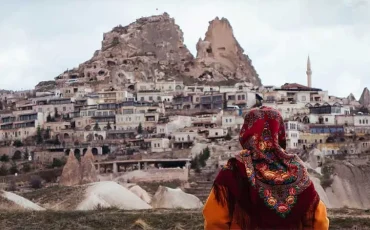What you read in this article:
Thanksgiving, primarily celebrated in the United States, is not a traditional holiday in Turkey. However, the cultural landscape in Turkey is complex and diverse, influenced by both its rich history and increasing globalization.
Historical Context and Cultural Landscape
Thanksgiving’s roots lie in American history, commemorating a 1621 harvest feast shared by Pilgrims and Native Americans.
Turkey, on the other hand, has its own unique cultural and religious traditions, shaped by its Ottoman past and secular present. Islam is the predominant religion, but Turkey is home to various faiths and cultures.
Awareness and Global Influence
While awareness of Thanksgiving exists in Turkey, particularly in urban areas and among those with international connections, it’s not widely celebrated.
Globalization and American cultural exports have increased familiarity with the holiday, but it remains largely viewed as a foreign tradition.
Similar Festivities and Interfaith Harmony
Turkey has its own harvest festivals and religious celebrations that may share thematic similarities with Thanksgiving, such as expressions of gratitude and family gatherings. These events often transcend religious boundaries, reflecting Turkey’s interfaith harmony.

Community Perspectives and Personal Observations
Some expatriates, international students, and Turks with connections to the U.S. may celebrate Thanksgiving privately. However, it’s not a part of mainstream Turkish culture or officially recognized.
Similarly, while not a traditional holiday, some people in Turkey also observe Christmas. You can read more about how Turkish people celebrate Christmas in the country.
In conclusion, while Thanksgiving is not traditionally celebrated in Turkey, the country’s diverse and evolving cultural landscape allows for varied personal observances and a growing awareness of international traditions.
Would you like me to elaborate on any specific aspect of this overview?
The Origins of Thanksgiving in the U.S
- The origins of Thanksgiving can be traced back to 1621 in Plymouth, Massachusetts.
- The Pilgrims, English settlers who arrived on the Mayflower, celebrated their first successful harvest in the New World.
- This celebration lasted for three days and involved about 50 Pilgrims and 90 Native Americans from the Wampanoag tribe.
- Governor William Bradford of Plymouth Colony organized the feast.
- Squanto, a Native American of the Patuxet tribe, played a crucial role in teaching the Pilgrims how to cultivate crops in the new land.
- Thanksgiving was celebrated sporadically in different colonies and states for many years.
- President George Washington issued the first Thanksgiving proclamation in 1789, calling for a day of gratitude for the end of the War of Independence.
- However, it wasn’t until 1863 that Thanksgiving became a regular national holiday.
- During the Civil War, President Abraham Lincoln officially proclaimed a national Thanksgiving Day.
- He set it as the last Thursday in November, aiming to foster unity in a divided nation.
- In 1941, Congress officially declared Thanksgiving a national holiday.
- It was set as the fourth Thursday in November, where it remains to this day.
- In recent years, there’s been increased recognition of the complex history between European settlers and Native Americans.
- Some observe the day as a National Day of Mourning, acknowledging the devastating impact of colonization on indigenous peoples.
- While primarily an American holiday, the concept of Thanksgiving has inspired similar celebrations in other countries.
- The American version has also been adopted by some international communities and expatriates worldwide.

Thanksgiving symbolizes
- Gratitude for abundance
- Coming together of diverse peoples
- Celebration of harvest and plenty
- evolved into a time for family gatherings, feasting, and expressing thankfulness
This historical context provides the foundation for understanding Thanksgiving’s place in American culture and its potential influence on other societies, including Turkey.
Cultural Landscape of Turkey
Rich cultural tapestry forms the backdrop against which any potential adoption or awareness of Thanksgiving in Turkey would be set, influencing how such a foreign tradition might be perceived or integrated.
- Turkey is a unique bridge between Europe and Asia, both geographically and culturally.
- This position has led to a rich blend of Eastern and Western influences.
- Ottoman Empire Legacy: Centuries of Ottoman rule have left a profound impact on Turkish culture.
- Atatürk’s Reforms: The founding of the modern Turkish Republic in 1923 brought significant cultural changes.
- The predominant religion, practiced by about 99% of the population.
- Majority Sunni, with a significant Alevi minority
- Other Faiths: Small communities of Christians, Jews, and other religions coexist.
- Turkey is officially a secular country, with freedom of religion guaranteed by the constitution.
- This creates a unique dynamic between religious traditions and modern secular life.
- Turkish: The official language, rich in borrowed words from Arabic, Persian, and French.
- Minority Languages: Kurdish, Arabic, Armenian, and Greek are also spoken by various communities.
- Turkey has shown a remarkable ability to adapt to global trends while maintaining its core cultural identity.

Thanksgiving Awareness: Understanding Levels in Turkish Society
Exploring the awareness of Thanksgiving within Turkish society unveils insights into how this American holiday is perceived and understood across cultural boundaries. This investigation delves into the levels of awareness and cultural significance of Thanksgiving among the Turkish population.
Similarly, there is a growing interest in how other international holidays are embraced or acknowledged, such as whether Turkish people celebrate Easter.
Levels of Awareness
- Limited Recognition: Thanksgiving is generally not widely recognized or celebrated in Turkey compared to other global holidays like Christmas or New Year’s Eve. Its cultural significance and historical context are often unfamiliar to many Turks.
- Urban vs. Rural Perspectives: In urban centers with more exposure to Western culture and international media, there may be a higher level of awareness about Thanksgiving. Conversely, rural areas may have minimal recognition of the holiday due to limited exposure and cultural exchange.
Cultural Importance
- Educational Context: Thanksgiving is not typically included in Turkish school curricula, which primarily focus on national and religious holidays significant to Turkish history and culture. As a result, there is limited formal education about Thanksgiving among Turkish youth.
- Media and Entertainment: International movies, television shows, and online content occasionally feature Thanksgiving celebrations, providing some exposure and context for those interested in Western customs and traditions.

Perceptions and Misconceptions
- Perceived as a Western Tradition: Among those aware of Thanksgiving, it is often perceived as a distinctly Western holiday rooted in American history and culture. This perception may influence how Turks interpret its significance and relevance to their own cultural identity.
- Similarities with Local Traditions: Some may draw parallels between Thanksgiving and Turkish customs such as harvest festivals or communal gatherings centered around gratitude and abundance, although these are not directly related to Thanksgiving.
Impact of Globalization
- Global Cultural Exchange: Globalization and increased connectivity through digital media have introduced Thanksgiving to a broader audience in Turkey. This exposure contributes to a gradual understanding and appreciation of the holiday’s cultural significance beyond its American origins.
- Cultural Adaptation: As Turkey continues to embrace global influences, there may be opportunities to integrate aspects of Thanksgiving into local celebrations or educational initiatives promoting cultural diversity and understanding.
Thanksgiving awareness in Turkish society reflects the broader dynamics of cultural exchange and global connectivity.
While its recognition may be limited compared to more familiar holidays, understanding and appreciating Thanksgiving enriches cultural awareness and promotes a spirit of gratitude and international cooperation.
As Turkey continues to engage with global cultures, the awareness and significance of Thanksgiving may evolve, contributing to a more interconnected world where diverse traditions are celebrated and respected.

Thanksgiving Globalization in Turkey
Globalization has significantly influenced the adoption and adaptation of Thanksgiving traditions in Turkey, enriching cultural diversity and expanding awareness of this American holiday.
This section explores the various ways globalization has shaped Thanksgiving celebrations within Turkish society.
Cultural Exchange and Awareness
American movies, television shows, and online content have popularized Thanksgiving traditions globally, including in Turkey. Exposure through media platforms has increased awareness and familiarity with Thanksgiving customs such as turkey dinners, pumpkin pie, and family gatherings.
Platforms like Instagram, YouTube, and Facebook play a role in showcasing international celebrations, including Thanksgiving.
Influencers and bloggers share their experiences and traditions, influencing how Turks perceive and potentially celebrate Thanksgiving. Beyond holiday traditions, social media also shapes global perceptions of a country’s culture and people, often leading to questions like are-turkish-people-friendly.
Mercial Influence
Global brands and businesses in Turkey capitalize on Thanksgiving by offering themed products, promotions, and special menus. Shopping malls, restaurants, and hotels cater to both residents and tourists seeking to experience traditional Thanksgiving meals and festivities.
Turkey’s tourism sector promotes Thanksgiving-themed events and activities to attract international visitors and showcase cultural diversity. This exchange fosters a deeper understanding and appreciation of American traditions within Turkish communities.

Educational Initiatives
Some educational institutions in Turkey incorporate Thanksgiving into their curriculum as part of global studies or English language classes. This educational approach exposes students to cultural diversity and promotes cross-cultural understanding.
Language schools and cultural centers may host Thanksgiving-themed workshops, cooking classes, or cultural events to engage participants in learning about American traditions and fostering intercultural dialogue.
Social and Community Impact
Expatriate communities in Turkey celebrate Thanksgiving, creating opportunities for cultural exchange and community building. These gatherings often blend American traditions with local customs, contributing to Turkey’s multicultural tapestry.
Thanksgiving serves as a bridge for interfaith dialogue and cooperation among different religious and cultural groups in Turkey. Shared celebrations promote unity, tolerance, and mutual respect within diverse communities.
Globalization continues to shape Thanksgiving celebrations in Turkey by fostering cultural exchange, expanding awareness, and promoting cross-cultural dialogue. As Turkey embraces diverse traditions from around the world, Thanksgiving serves as a symbol of unity, gratitude, and shared humanity.
By integrating global influences with local customs, Turkey enriches its cultural landscape and celebrates Thanksgiving as a testament to cultural diversity and international solidarity.
Coexistence of Religions During Thanksgiving
Turkey’s rich tapestry of religions and cultures fosters a unique environment where diverse communities coexist and celebrate various traditions.
Exploring interfaith harmony during Thanksgiving offers insights into how different religious groups in Turkey perceive and engage with this global holiday.

Religious Diversity in Turkey
- Islam: As the predominant religion in Turkey, Islam influences societal norms and cultural practices. While Thanksgiving is not rooted in Islamic tradition, Turkish Muslims may participate in or acknowledge the holiday as a cultural event rather than a religious observance.
- Christianity: Turkey is home to a small Christian minority, including Armenians, Greeks, and Syriacs, who may celebrate Thanksgiving within their churches or communities, integrating aspects of their faith into the holiday’s festivities.
Perspectives on Thanksgiving
- Muslim Community: Many Turkish Muslims view Thanksgiving positively as a secular holiday centered on gratitude, family, and community. While it may not hold religious significance, Thanksgiving aligns with Islamic values of charity, hospitality, and communal unity.
- Christian Community: Turkish Christians, particularly those from Western traditions, may observe Thanksgiving as both a cultural and religious celebration, reflecting on blessings and giving thanks within the context of their faith.
Interfaith Dialogue and Cooperation
- Community Events: Interfaith organizations and initiatives in Turkey promote dialogue and cooperation among different religious groups, including during holidays like Thanksgiving. Joint celebrations or charitable activities foster mutual understanding and respect.
- Cultural Exchange: Thanksgiving serves as a platform for cultural exchange and mutual appreciation among diverse religious communities in Turkey. Shared traditions and values of gratitude contribute to social cohesion and unity.

In conclusion, the coexistence of religions during Thanksgiving in Turkey exemplifies the country’s commitment to religious diversity, tolerance, and unity.
As Turkish society embraces global traditions, including Thanksgiving, it strengthens interfaith harmony and reinforces the values of gratitude and communal goodwill.
By celebrating together, irrespective of religious affiliation, Turkey exemplifies a model of peaceful coexistence and cultural enrichment through shared festivities like Thanksgiving.
Turkey’s Approach to Thanksgiving
Turkey’s approach to Thanksgiving exemplifies a unique synthesis of cultural and religious traditions, reflecting the country’s diverse heritage and openness to global influences.
This section explores how Turkish society embraces and adapts Thanksgiving, creating a distinctive celebration that blends various cultural elements.
Synthesis of Cultural Traditions
- Traditional Turkish Customs: Thanksgiving in Turkey may incorporate elements of local customs and traditions related to harvest festivals or communal feasts. These traditions emphasize gratitude, hospitality, and community spirit, resonating with the themes of Thanksgiving.
- Global Influences: As a global holiday, Thanksgiving introduces Turkish society to American traditions such as turkey dinners, pumpkin pie, and family gatherings. These elements are often adapted to suit local tastes and preferences while honoring the holiday’s essence of giving thanks.
Religious Diversity
- Islamic Perspective: In predominantly Muslim Turkey, Thanksgiving is often observed as a secular holiday focused on gratitude and unity rather than religious observance. Muslims may participate in community events or acknowledge the holiday’s values of generosity and reflection.
- Christian Communities: Turkish Christians, including Armenians, Greeks, and others, may integrate Thanksgiving into their religious and cultural practices, blending aspects of their faith with American traditions of giving thanks.

Cultural Integration
Community Celebrations: Cities and towns across Turkey host Thanksgiving-themed events and activities that promote cultural exchange and understanding. These celebrations encourage participation from diverse communities, fostering a sense of inclusivity and shared celebration.
Culinary Traditions
Turkish Cuisine: Thanksgiving in Turkey often features a fusion of traditional Turkish dishes alongside American-inspired favorites. Local ingredients and flavors contribute to a rich culinary experience that reflects both cultural diversity and culinary creativity.
Educational and Social Impact
- School Programs: Some educational institutions in Turkey introduce Thanksgiving as part of global studies or English language classes, educating students about different cultural traditions and fostering cross-cultural awareness.
- Social Cohesion: Thanksgiving serves as a platform for social cohesion and community building in Turkey, bringing together people of different backgrounds to celebrate shared values of gratitude, generosity, and togetherness.
Turkey’s approach to Thanksgiving underscores its commitment to cultural diversity, integration, and mutual respect. By blending local customs with global traditions, Turkish society creates a unique celebration that embraces the spirit of Thanksgiving while honoring its own rich cultural heritage.

This cultural fusion not only enriches Turkey’s societal tapestry but also promotes global understanding and appreciation of diverse traditions worldwide.
As Turkey continues to evolve and embrace global influences, its approach to Thanksgiving serves as a testament to the power of cultural exchange and the universal values of gratitude and unity.
Changes and Continuity in Thanksgiving Observances
Examining generational shifts in Thanksgiving observances in Turkey provides insights into how this global holiday has evolved, reflecting changes in cultural dynamics and societal values.
This section explores both continuity and adaptation in how different generations approach and celebrate Thanksgiving.
Continuity in Tradition
- Traditional Values: Older generations in Turkey often uphold the core values of Thanksgiving, such as gratitude, family unity, and communal sharing. They may emphasize traditional dishes and rituals that have been passed down through families, maintaining a sense of continuity with American traditions.
- Family Gatherings: Thanksgiving continues to be a time for families to come together, irrespective of generational differences. Older generations may prioritize family dinners and gatherings as essential to celebrating the holiday.

Adaptation to Modernity
- Cultural Integration: Younger generations in Turkey adapt Thanksgiving to align with modern lifestyles and preferences. They may blend American customs with local traditions or integrate new technologies, such as social media, to connect with global celebrations.
- Changing Tastes: Preferences in food and entertainment have evolved over generations, influencing how Thanksgiving is observed. Younger Turks may experiment with diverse cuisines and activities that reflect their globalized outlook.
Influence of Globalization
- Media and Connectivity: Global influences, facilitated by media and digital platforms, shape how younger generations perceive and participate in Thanksgiving. Exposure to international trends and lifestyles impacts their interpretation and celebration of the holiday.
- Educational Impact: Schools and universities introduce Thanksgiving as part of multicultural education, encouraging students to explore and appreciate diverse cultural traditions. This educational approach fosters a broader understanding of global festivals.

Tural Revival and Innovation
- Revival of Traditions: Some younger Turks embrace traditional Thanksgiving practices as a form of cultural revival, reconnecting with their heritage and family roots. This resurgence reflects a renewed interest in preserving cultural identity through festive celebrations.
- Innovative Celebrations: Urban centers in Turkey witness innovative forms of Thanksgiving celebrations, blending traditional customs with contemporary art, music, and culinary experiences. These creative expressions cater to diverse tastes and preferences.
Generational shifts in Thanksgiving observances in Turkey highlight a dynamic interplay between continuity and adaptation in cultural practices.
As Turkey navigates modernity and global influences, Thanksgiving serves as a symbol of cultural exchange, unity, and gratitude across different age groups.
By embracing both traditional values and contemporary innovations, Turks forge a path that honors their cultural heritage while embracing the diversity of global traditions.
This evolution underscores Turkey’s vibrant cultural landscape and its capacity to integrate diverse influences into everyday celebrations like Thanksgiving.
Understanding Thanksgiving in Turkish Society
Understanding Thanksgiving in Turkish society involves appreciating how this global holiday is interpreted, celebrated, and integrated into the cultural fabric of the country. This section explores the perceptions, traditions, and significance of Thanksgiving within Turkish society.
Perceptions of Thanksgiving
Cultural Understanding: Thanksgiving is viewed in Turkey as a holiday centered on gratitude, family, and community, aligning with universal values of appreciation and reflection.
Global Awareness: Awareness of Thanksgiving has grown in Turkey through media, education, and cultural exchanges, fostering a deeper understanding of American traditions and their global impact.

Embracing Global Traditions
Cultural Integration: Turkish society integrates Thanksgiving with local customs and values, creating a unique blend of international and indigenous celebrations.
Social Cohesion: Thanksgiving promotes social cohesion by bringing together people from diverse backgrounds to share in the spirit of gratitude and unity.
Educational Significance
Multicultural Education: Schools and universities in Turkey include Thanksgiving in their curriculum to promote cultural diversity and global citizenship.
Interfaith Dialogue: Thanksgiving serves as a platform for interfaith dialogue and understanding, transcending religious boundaries to emphasize shared human values.
Traditional and Modern Practices
Family Traditions: Many Turkish families celebrate Thanksgiving with traditional meals and rituals, preserving cultural heritage while embracing global festivities.
Innovative Celebrations: Urban centers in Turkey host modern interpretations of Thanksgiving, featuring culinary events, art exhibitions, and community outreach programs.
Cultural appreciation of Thanksgiving in Turkish society exemplifies a harmonious blend of global traditions and local values. By embracing gratitude and community spirit, Turks enrich their cultural landscape while fostering mutual understanding and respect.
Thanksgiving serves as a bridge between diverse cultures, promoting unity and shared humanity in Turkey and beyond. As Turkish society continues to evolve, its approach to Thanksgiving reflects a commitment to cultural diversity, social harmony, and the enduring power of gratitude in everyday life.

The Role of Thanksgiving in Turkey’s Cultural Calendar
Exploring the role of Thanksgiving in Turkey’s cultural calendar illuminates how this global holiday fits into the country’s diverse tapestry of festive celebrations. This section delves into the significance of Thanksgiving alongside other cultural and religious observances in Turkey.
Cultural Significance
Gratitude and Unity: Thanksgiving in Turkey resonates with values of gratitude, family unity, and community spirit, similar to other traditional Turkish festivals like Eid al-Fitr and Newroz.
Global Integration: As a global holiday, Thanksgiving enriches Turkey’s cultural landscape by integrating American customs with local traditions, creating a harmonious blend of cultural expressions.
Interfaith Dialogue
- Inclusive Celebrations: Thanksgiving promotes interfaith dialogue and understanding in Turkey, bringing together people of different religious backgrounds to celebrate shared values of thankfulness and generosity.
- Religious Neutrality: Unlike religious festivals, Thanksgiving is observed as a secular holiday in Turkey, emphasizing universal themes that transcend religious affiliations.
Social and Community Impact
- Community Engagement: Thanksgiving fosters social cohesion by encouraging community engagement through charitable activities, volunteerism, and cultural events.
- Educational Opportunities: Schools and universities in Turkey incorporate Thanksgiving into educational programs to promote cultural diversity, tolerance, and global awareness among students.

Role Among Festive Celebrations
- Complementary Festivities: Thanksgiving complements existing Turkish festivals by offering a unique perspective on gratitude and cultural exchange.
- Seasonal Connections: Occurring in late November, Thanksgiving aligns with the spirit of autumn harvest festivals celebrated in various regions of Turkey, symbolizing abundance and renewal.
The role of Thanksgiving in Turkey’s cultural calendar underscores its significance as a bridge between diverse traditions and values. By embracing gratitude and communal spirit, Turks enrich their cultural heritage while embracing global festivities.
Thanksgiving’s presence in Turkey promotes cultural diversity, interfaith harmony, and social cohesion, contributing to a vibrant and inclusive cultural calendar that celebrates unity and shared humanity.
As Turkey continues to evolve, Thanksgiving remains a symbol of cultural exchange and mutual appreciation in the country’s dynamic cultural landscape.
Comparing Thanksgiving Traditions Worldwide
Comparing Thanksgiving traditions in Turkey with global celebrations offers a fascinating insight into how cultures around the world embrace gratitude and thankfulness. This section explores the similarities, differences, and cultural nuances that define Thanksgiving in Turkey and its counterparts worldwide.
Turkey’s Unique Approach
Cultural Synthesis: In Turkey, Thanksgiving blends American customs with local traditions, emphasizing gratitude and communal meals that reflect Turkish hospitality.
Secular Observance: Unlike religious festivals, Thanksgiving in Turkey is observed as a secular holiday, focusing on family gatherings and charitable activities.
North America: United States and Canada
Historical Origins: Thanksgiving in the United States and Canada traces its roots to harvest festivals celebrated by indigenous peoples and European settlers.
Traditional Meals: Traditional Thanksgiving meals in North America feature roasted turkey, cranberry sauce, pumpkin pie, and other seasonal dishes shared with family and friends.

Latin America: Brazil
Cultural Adaptation: In Brazil, Thanksgiving (Dia de Ação de Graças) is observed by Brazilian Christians, often with church services and festive meals.
Influence of Christianity: Brazilian Thanksgiving incorporates Christian traditions of gratitude and thanksgiving, reflecting the country’s religious diversity.
Asia: Japan
Modern Observance: In Japan, Thanksgiving (Kinrō Kansha no Hi) is celebrated on November 23rd, focusing on labor and productivity rather than harvest.
Cultural Exchange: Japanese Thanksgiving emphasizes community service, expressions of gratitude, and promoting harmony within society.
Europe: Germany
Harvest Festivals: Germany celebrates Erntedankfest (Harvest Festival) as a form of Thanksgiving, emphasizing agricultural abundance and community feasts.
Cultural Significance: German Thanksgiving highlights local traditions, regional foods, and church services that reflect the country’s agricultural heritage.
Comparing Thanksgiving traditions worldwide reveals a rich tapestry of cultural diversity, historical significance, and communal values. In Turkey, as well as globally, Thanksgiving serves as a time to reflect on blessings, celebrate abundance, and foster unity among diverse communities.
While each country embraces unique customs and rituals, the universal themes of gratitude and togetherness unite people across continents in the spirit of thanksgiving.
As Turkey continues to integrate global influences into its cultural fabric, Thanksgiving remains a testament to the enduring power of shared values and cross-cultural appreciation in a diverse world.
Summary
Our exploration of Thanksgiving in Turkey has revealed a fascinating tapestry of cultural interactions and adaptations. While Thanksgiving is not a traditional Turkish holiday, its presence in certain pockets of Turkish society illustrates the country’s evolving cultural landscape.
We’ve traced the historical roots of Thanksgiving in the U.S, examined Turkey’s rich cultural diversity, and explored the awareness and observance of Thanksgiving among various communities in Turkey.
FAQ
No, Thanksgiving is not a national or cultural holiday in Turkey.
While Turkey has many national and religious holidays, none are directly similar to Thanksgiving in terms of the harvest and feasting tradition.
The closest concept would be large family gatherings during religious holidays like Eid al-Adha and Eid al-Fitr, but these are not harvest-related.
Thanksgiving is a holiday with specific historical roots in American and Canadian culture that do not exist in Turkey’s history.





Comments